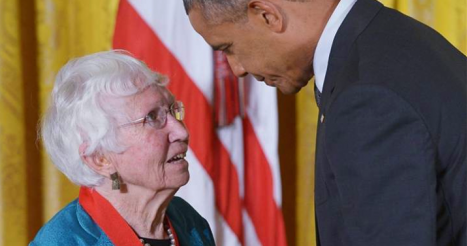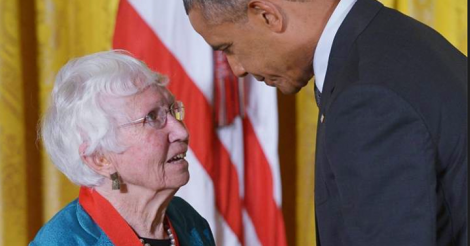
“Most leaders are indispensable, but to produce a major social change,
many ordinary people must also be involved.”
—Anne Firor Scott
By Karys Blakemore
There are people who seek to challenge stereotypes about women and their roles in American society; people who not only perceive women as they really are, but also attempt to bring the real woman to the forefront of academia and popular culture. To put it quite simply, Anne Firor Scott (ΦΒΚ, University of Georgia, 1941) is one of these people.
Scott’s impressive career as a historian began after she graduated summa cum laude from the University of Georgia in 1941. She then went on to receive a master’s degree in political science from Northwestern University in Illinois and a doctorate in history from Harvard University. These degrees enabled Scott to pursue her passion and scholarly interest: women’s history.
In 1955, Scott applied for and was awarded a fellowship with the American Association of University Women. The funds provided by AAUW helped Scott to complete her dissertation on progressive politics in the south. Many scholars, including AAUW archives intern Elizabeth Beckman, consider this fellowship to have “… played a critical role in launching her career.”
Scott’s professional successes after her fellowship speak volumes about her desire to achieve. From 1961 to 1991, she taught in the history department at Duke University, eventually becoming W.K. Boyd Professor of History Emerita. Furthermore, in 1965 she was appointed to the Citizens’ Advisory Council on the Status of Women by President Lyndon B. Johnson himself.
Perhaps the most significant product of Scott’s academic pursuits is her book The Southern Lady: From Pedestal to Politics, 1831-1930 (1970). In this groundbreaking classic, Scott utilized her knowledge of women’s studies and politics to explore and expose the world of Southern American women of the 19th and early 20th centuries. Her research into this often stereotyped group of women was literally unprecedented in the field of women’s history. According to her son David, Scott’s book made her a mentor to an entire generation of historians.
Scott’s contributions to women’s studies and history are significant because they shed light on the lives of women who were either previously misunderstood or largely ignored by the academic community. It is important to recognize, however, that Scott’s own life also exemplifies the feminist beliefs that drove her research and career. Scott applied for the AAUW fellowship so that she could complete her dissertation while also raising three children with her husband. When she learned that she had been awarded the fellowship, Scott stated that she was pleasantly surprised. “In a somewhat now-or-never mood I asked for money to pay a nanny, so that I could finish my dissertation,” she recalled. “To my astonishment, it was provided, and I finally finished.” At the time, Scott’s decision to continue her research while also raising a family was unconventional and progressive.
Scott also broke glass ceilings in a variety of organizations and institutions. In 1980, while teaching at Duke University, Scott became the history department’s first female chair. She also served as President of the Organization of American Historians.
In 2013, Scott was awarded a National Humanities Medal for “… pioneering the study of women in the American South.” This recent acknowledgement of Scott’s incredible contribution to women’s history is yet another reminder that Scott exemplifies the academic excellence and integrity inherent of all members of Phi Beta Kappa.
Photo at top: Anne Firor Scott receiving the National Humanities Medal from President Barack Obama in a White House ceremon held July 28, 2014.
Karys Blakemore is currently a senior at George Mason University majoring in Russian and Eurasian Studies and Spanish as a foreign language. She became a member of Phi Beta Kappa in her junior year. George Mason is home to the Omicron of Virginia Chapter of Phi Beta Kappa.




